John Montagu, 4th Earl of Sandwich facts for kids
Quick facts for kids
The Earl of Sandwich
|
|
|---|---|
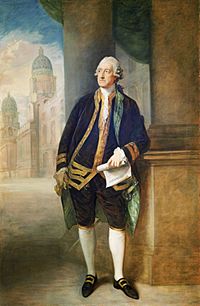
The 4th Earl of Sandwich
by Thomas Gainsborough |
|
| Secretary of State for the Northern Department | |
| In office 19 December 1770 – 12 January 1771 |
|
| Prime Minister | Lord North |
| Preceded by | The Earl of Rochdale |
| Succeeded by | The Earl of Halifax |
| In office 9 September 1763 – 10 July 1765 |
|
| Prime Minister | George Grenville |
| Preceded by | The Earl of Halifax |
| Succeeded by | The Duke of Grafton |
| First Lord of the Admiralty | |
| In office 1771–1782 |
|
| Prime Minister | Lord North |
| Preceded by | Sir Edward Hawke |
| Succeeded by | The Viscount Keppel |
| In office 1763–1763 |
|
| Prime Minister | The Earl of Bute |
| Preceded by | George Grenville |
| Succeeded by | The Earl of Egmont |
| In office 1748–1751 |
|
| Prime Minister | Henry Pelham |
| Preceded by | The Duke of Bedford |
| Succeeded by | The Lord Anson |
| Postmaster General | |
| In office 1768–1771 |
|
| Prime Minister | |
| Preceded by | The Marquess of Downshire |
| Succeeded by | Henry Carteret |
| Personal details | |
| Born | 13 November 1718 |
| Died | 30 April 1792 (aged 73) Chiswick, Middlesex, England |
| Resting place | All Saints' Church, Barnwell |
| Spouse | Dorothy Fane |
| Domestic partner | Martha Ray |
| Children |
|
| Parents |
|
| Alma mater | Eton College, Trinity College, Cambridge |
| Profession | Statesman |
John Montagu, 4th Earl of Sandwich (born November 13, 1718 – died April 30, 1792) was an important British politician. He became the Earl of Sandwich at just ten years old in 1729. Throughout his life, he held many important jobs in the government and military. These included Postmaster General, First Lord of the Admiralty (in charge of the navy), and Secretary of State for the Northern Department. He is also famous for the popular story that he invented the sandwich!
Contents
Biography of John Montagu
Early Life and Education
John Montagu was born in 1718. His father passed away when John was only four years old, making him the heir to his family's title. He became the Earl of Sandwich when he was ten.
He went to school at Eton College and Trinity College, Cambridge. After his studies, he traveled around Europe on a "Grand Tour." He also visited more unusual places like Greece, Turkey, and Egypt. These travels later inspired him to create groups focused on studying Eastern cultures. When he returned to England in 1739, he joined the House of Lords, which is part of the British Parliament. He became known for his speeches and for criticizing the government's actions in the War of the Austrian Succession.
Starting a Political Career
In 1744, John Montagu joined the government as a commissioner of the Admiralty. This meant he helped manage the British Navy. He worked closely with Lord Anson, an experienced admiral. While the head of the Admiralty, the Duke of Bedford, was often away, Sandwich and Anson handled much of the daily work. Anson focused on training the navy, while Sandwich managed the administration. They helped develop a new naval strategy that led to important British victories at sea.
The next year, Sandwich also became a colonel in the British Army. This was during a time when there was a threat of a French invasion. He served in a regiment formed by the Duke of Bedford. Although he became very ill during this time, he recovered and returned to his navy duties. He remained an army officer for the rest of his life, even though he didn't actively serve in battles again.
Peace Talks and Diplomacy
In 1746, Sandwich was sent to the Congress of Breda to help negotiate peace. He played a key role in these talks, which led to the Treaty of Aix-la-Chapelle in 1748. During this time, he was also the ambassador to the Dutch Republic. He used information from the British secret service to gain an advantage in the negotiations. His work at Breda impressed powerful politicians, who then helped him get important jobs when he returned home.
First Lord of the Admiralty Role
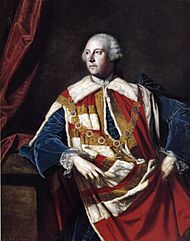
In February 1748, Sandwich became the First Lord of the Admiralty for the first time. He held this position until 1751. After this, he spent some years away from politics, focusing on his country estate. However, he stayed in touch with his political friends and watched Britain's involvement in the Seven Years' War. Thanks to naval improvements, the British Navy had many successes during this war.
He returned to the Admiralty in 1763 and encouraged a major program to rebuild the Royal Navy. During this period, he met Martha Ray, who became a significant person in his life. He was soon dismissed from this role but was offered the important position of Ambassador to Madrid.
Serving as Northern Secretary
In August 1763, Sandwich became the Secretary of State for the Northern Department. He held this job until July 1765. He also served as Postmaster General from 1768 to 1771. Briefly, from December 1770 to January 1771, he was Secretary of State again.
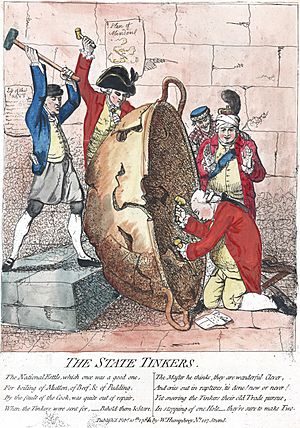
Leading the Admiralty Again
Sandwich served his third and longest term as First Lord of the Admiralty from 1771 to 1782. This was a very challenging time, especially with the start of the American War of Independence in 1775.
One of his major achievements was supporting the "coppering" of naval ships. This meant covering the bottom of ships with copper. This made ships faster and allowed them to stay at sea much longer without needing repairs. This was a very expensive but important change for the Royal Navy.
When war broke out with France in 1778, Sandwich argued for keeping the main British fleet in European waters to protect against invasion. His policy was largely followed. His problems grew when Spain joined the war in 1779, giving France and Spain more ships than the British Navy. Despite these challenges, the newly coppered ships helped the British Navy win important battles, like the Battle of the Saintes in 1782.
Personal Life and Family
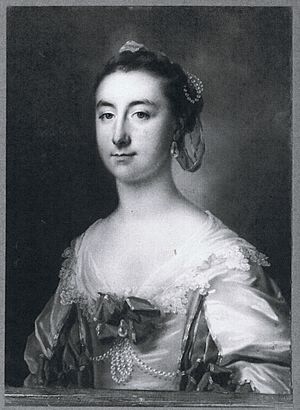
Sandwich married Dorothy Fane, and they had a son named John, who later became the 5th Earl. Sadly, his wife's health declined, and she became very ill.
During this difficult time, Sandwich had a relationship with a singer named Martha Ray. They had several children together. In April 1779, Martha Ray was tragically killed by another man. This event deeply saddened Sandwich, and he never fully recovered from his grief.
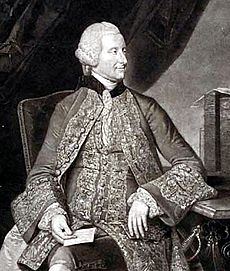
Sandwich retired from public life in 1782 and lived for another ten years at his family home, Hinchingbrooke House. He passed away on April 30, 1792, and his son inherited his title.
Legacy and Famous Connections
The Invention of the Sandwich
The popular food item, the sandwich, is named after Lord Sandwich! The exact story of how it was invented is still debated. A common tale says that Lord Sandwich loved to gamble and didn't want to leave the card table for meals. So, he asked his servants to bring him slices of meat between two pieces of bread. Other people supposedly started ordering "the same as Sandwich!", and that's how the sandwich got its name.
However, some historians believe the sandwich was more likely created because of his busy work schedule. He might have eaten it at his desk to save time while working on navy and political matters.
Islands Named by Captain Cook
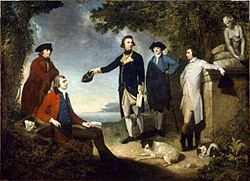
Lord Sandwich was a strong supporter of the famous explorer Captain James Cook. As First Lord of the Admiralty, Sandwich approved money for Cook's ships, the Resolution, Adventure, and Discovery. These ships were used for Cook's second and third voyages of exploration in the Pacific Ocean.
In honor of Lord Sandwich, Captain Cook named several places after him:
- The Hawaiian Islands were originally called the "Sandwich Islands."
- Montague Island off Australia.
- The South Sandwich Islands in the Southern Atlantic Ocean.
- Montague Island in the Gulf of Alaska.
- Hinchinbrook Island was named after the Montagu family's home.
Lord Sandwich also donated items given to him by Cook to Trinity College, Cambridge.
Interests and Hobbies
Cricket Enthusiast
Like his friends, the Duke of Bedford and the Earl of Halifax, Sandwich was very interested in cricket. Records show his involvement in the sport as early as 1741. He was the patron and captain of the Huntingdonshire county team. He also helped form the Northamptonshire & Huntingdonshire team, which won several matches.
Love for Music
After his naval career, Sandwich dedicated a lot of his energy to music. He especially loved "ancient music," which he defined as music more than twenty years old. He supported the Italian violinist Felice Giardini and created a "Catch Club" where professional singers performed old and new songs. He also organized performances of George Frideric Handel's musical works at his estate. Sandwich was key in creating the Concert of Ancient Music, which was one of the first public concerts to feature older, classic musical pieces.
Key Dates in His Life
- 1718: Born on November 13.
- 1729: Became the Earl of Sandwich at age ten.
- 1729: Attended Eton and Trinity College, Cambridge.
- 1740/41: Married Dorothy Fane.
- 1746: Sent to the Congress of Breda for peace negotiations.
- 1748–1751: First time serving as First Lord of the Admiralty.
- 1763: Became one of the main secretaries of state.
- 1763: Second time serving as First Lord of the Admiralty.
- 1768: Appointed Postmaster General.
- 1770: Became Secretary of State again.
- 1771–1782: Third and final time serving as First Lord of the Admiralty (during the American Revolutionary War).
- 1779: His partner, Martha Ray, passed away.
- 1782: Retired from public service in March.
- 1792: Died on April 30.
In Books and TV Shows
A picture of the 1st Earl appeared in a book called Fisher's Drawing Room Scrap Book in 1837. It included a poem by Letitia Elizabeth Landon about the Earl of Sandwich, which was actually about the 4th Earl and the islands named after him.
Actor Bill Nighy played Lord Sandwich in the TV series Longitude in 2000.
See also
 In Spanish: John Montagu para niños
In Spanish: John Montagu para niños
 | Emma Amos |
 | Edward Mitchell Bannister |
 | Larry D. Alexander |
 | Ernie Barnes |

